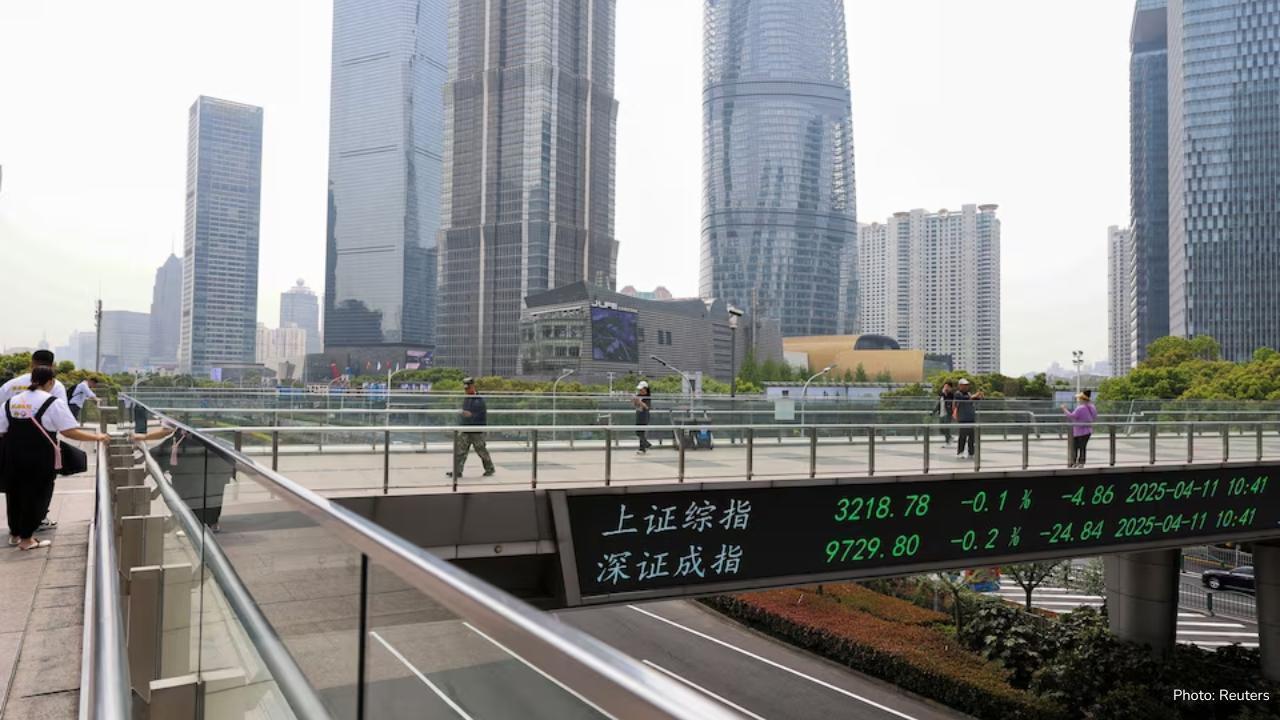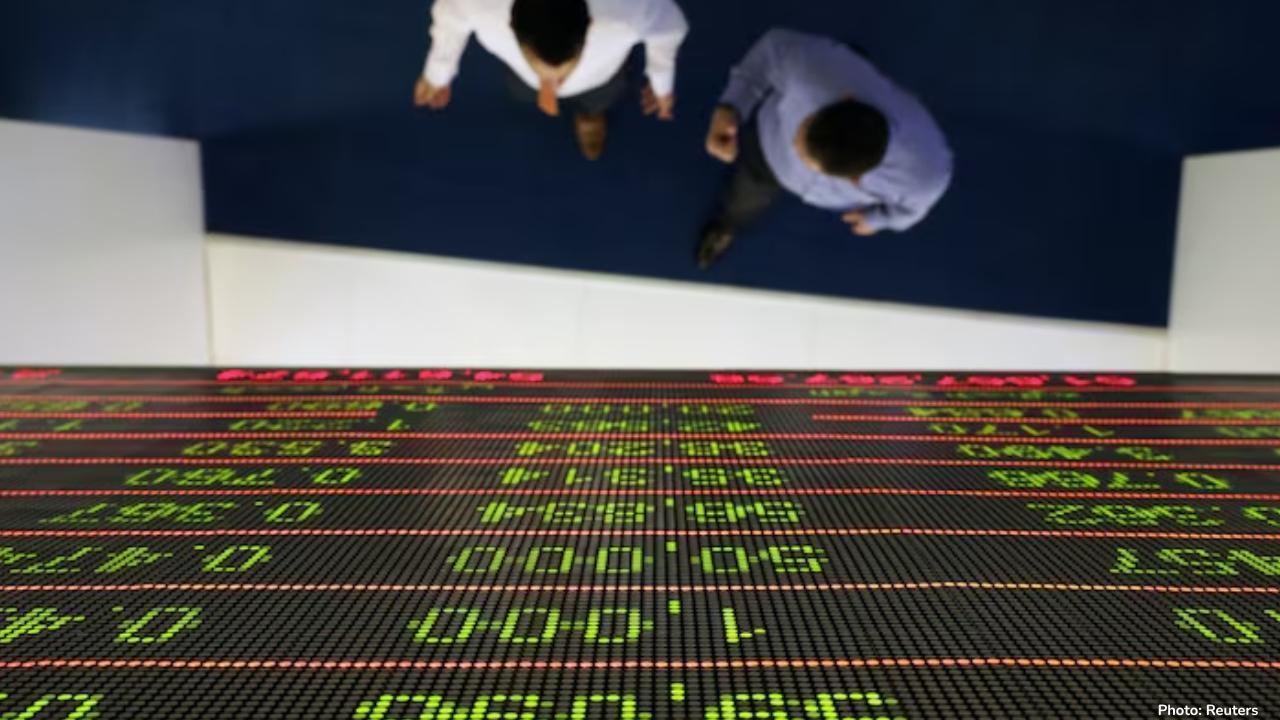
Post by : Monika
Global financial markets experienced significant fluctuations on October 13, 2025, due to ongoing trade tensions between the United States and China. Investors around the world are watching these developments closely, as they have the potential to affect economies in Asia, Europe, and North America. The uncertainty has caused shifts in stock prices, currency values, bond yields, and commodity prices.
Asian Markets Slide Amid Trade Concerns
Asian stock markets were particularly affected. In Japan, the Nikkei 225 futures fell sharply, reflecting investor concerns about the ongoing political instability in the country, as well as fears of further global economic slowdown. In addition, a national holiday in Japan led to low trading volumes, which made the market more sensitive to fluctuations.
In China, the CSI300 Index, which tracks the largest companies on the Shanghai and Shenzhen stock exchanges, declined as investors feared that potential U.S. tariffs could harm Chinese exports. Analysts note that Chinese companies heavily reliant on trade with the U.S. may face lower profits if tensions escalate.
South Korea and Australia also saw declines in their major indices, including the KOSPI and ASX 200, as regional investors reacted to the uncertainty surrounding the U.S.-China trade negotiations. These drops illustrate how deeply interconnected Asian markets are with global trade policies and diplomatic developments.
U.S. Markets Show Signs of Recovery
In the United States, markets were more stable. Futures for the S&P 500 and Nasdaq rose, suggesting optimism that the trade tensions may be resolved. U.S. investors are hopeful that negotiations with China could prevent the proposed 100% tariffs on Chinese imports from taking effect by November 1.
The U.S. dollar and Japanese yen experienced modest fluctuations, reflecting cautious optimism. Bond yields decreased slightly, as traders anticipate that the Federal Reserve could consider adjusting interest rates to counter economic uncertainty caused by trade disruptions.
Commodities React to Global Tensions
Global commodity markets also reacted strongly. Gold prices reached record highs, as investors typically consider gold a safe-haven asset during times of uncertainty. Rising gold prices indicate that investors are seeking protection against potential losses in stock markets.
Oil prices also rose slightly, fueled by hopes that trade negotiations between the U.S. and China could stabilize global economic growth. Analysts note that oil demand is closely linked to industrial production, which could be affected by tariffs or slower trade flows.
Trade Tensions Escalate and Ease
The tensions between the U.S. and China intensified after President Donald Trump threatened to impose 100% tariffs on Chinese goods by November 1. The announcement caused immediate concern among investors worldwide, as such tariffs could severely disrupt trade, raise prices for consumers, and slow economic growth.
However, over the weekend, President Trump adopted a more conciliatory tone. He stated that “everything will be fine” and emphasized that the U.S. did not intend to harm China. This statement helped calm some market fears.
Beijing also responded cautiously. China defended its previous restrictions on rare earth exports, which are critical for electronics and defense industries. At the same time, Chinese officials refrained from imposing new tariffs on U.S. products. This approach suggested that both sides might seek a compromise to avoid escalating the economic conflict further.
Analysts suggest that one possible solution could involve extending the current tariff pause beyond November 10, with limited concessions from both countries. While this would not fully resolve trade tensions, it could provide temporary relief to global markets.
European Markets Face Political Uncertainty
European financial markets are facing pressure as well, not only from trade tensions but also from domestic political instability. In France, the new prime minister has encountered difficulties in forming a stable government. This uncertainty has contributed to investor anxiety and cautious trading in European stock markets.
Despite these challenges, some European indices remained relatively stable. Investors are closely monitoring developments in both political and economic arenas, as decisions in Europe can influence global investment flows and corporate confidence.
Sectoral Impacts of Market Movements
Investor Sentiment and Market Psychology
Investor behavior has reflected a mix of caution and optimism. Many are watching statements from global leaders closely to anticipate possible changes in trade policy. Safe-haven assets like gold and U.S. Treasury bonds are in demand, while equities remain sensitive to news of tariffs or diplomatic progress.
Trading strategies currently focus on risk management. Hedge funds and institutional investors are carefully balancing portfolios to protect against sudden market swings while also positioning for potential gains if tensions ease.
Looking Ahead: What to Watch
Several key developments will shape global markets in the near future:
Global markets are currently navigating a period of high uncertainty due to U.S.-China trade tensions, political instability in Europe, and regional economic challenges. While Asian markets showed declines, U.S. futures indicated optimism that a resolution may be possible.
Investors are cautious but closely watching developments that could influence trade policies, economic growth, and financial stability. Safe-haven assets like gold are rising, while technology, automotive, and manufacturing sectors remain sensitive to any changes in tariffs or political decisions.
In the coming weeks, markets will continue to respond to negotiations, political events, and economic indicators. For global investors, careful monitoring of news and strategic risk management will be essential to navigate this volatile period successfully.
Global markets news U.S.-China trade tensions Asian stock markets fall










Trump's Trade War Escalates, Disrupting IMF and World Bank Talks
President Trump's renewed trade war with China, including 100% tariffs and export controls, overshad

China Detains Dozens of Underground Church Pastors in Crackdown
China detains dozens of pastors from Zion Church, one of the largest underground Christian churches,

Gold & Silver Hit Record Highs Amid US-China Trade Tensions
Gold and silver prices reached all-time highs on October 13, 2025, driven by escalating US-China tra

Indian Police Investigate Cough Syrup Maker After Child Deaths
Indian authorities raid Sresan Pharma's facilities over toxic cough syrup linked to 19 child deaths;

18 Swiss Police Hurt in Pro-Palestine Protest in Bern
18 Swiss police officers were injured during an unauthorized pro-Palestine protest in Bern, leading

Egypt to Host Global Summit in Sharm el-Sheikh on Gaza War
Egypt will convene over 20 world leaders in Sharm el-Sheikh with Trump to finalize the Gaza war agre